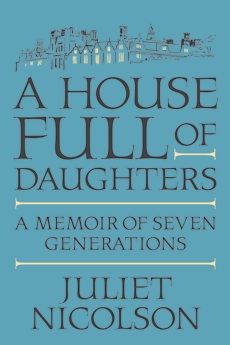By David Madden
Dear Reader, let’s pretend that I am an editor conferring with Juliet Nicholson about the manuscript version of A House Full of Daughters.
Straight away, Juliet, I am eager to say that this is a memoir few readers will willingly put down. Utterly fascinating. Anyone who knows about the fabulous lives of Vita Sackville-West and her husband Harold Nicholson, and especially if they know something about Vita’s mother Victoria and her grandmother Pepita and great grandmother Consuela—will want to surrender happily to your own story of the seven generations of your family, including your own story and that of your daughters and your granddaughter.
I wish to call your attention to what I think you have done most effectively and urge you to use those features as models as you conduct the final revision….
Although the title alone will prompt some readers to reach for it on the shelf–so don’t even think of changing it—the basic appeal to literary readers is the house of Sackville-West, and the quite well known affair between Vita Sackville-West and Virginia Woolf. Once into that world, readers will, I imagine, embrace the entire brilliant but sad family, your conniving great-great-great grandmother Consuela, your great-great-grandmother, Pepita, famous as a dancer, your great-grandmother Victoria, the very young toast of Washington, DC, and, of course, your bi-sexual grandmother, Vita.
My worry is that after the famous Vita’s story, readers may perceive with some dismay that the second half of your memoir is given over to mothers and daughters unknown to most readers. One hopes that they will read on, as I did, and discover illuminating parallels between the fascinating women who came before and your own sad mother, Philippa, and indeed yourself, a daughter who succeeded in breaking the chain of unhappy daughter-hoods with your own daughters, Clemmie and Flora, and with your granddaughter, Imogen—independence, forgiveness, and love supplanting dependence, captivity, misguided loyalty, loneliness, ambivalence, confusion, escape, guilt, and much more. One element of unity is your consistent drawing of parallels, from mother to mother, daughter to daughter.
For instance, consider this passage, nabbed at random: “Vita described how after Victoria’s death she managed to look back on her mother’s life and gain a new and fairer perspective on her. I, too, felt an urgent need to write something down, to try to work out what I felt about my mother.”
And, of course, your attention to all the notable fathers, husbands, and brothers makes the given richness of the lives of the women even richer for your readers. Some readers will have read Portrait of a Marriage, that your father Nigel Nicholson put together, drawing upon Vita’s extremely well-written, otherwise unpublished, memoir and your grandfather’s letters. Fewer readers will have read Vita’s first novel, The Edwardians. Let’s hope your own previous three books have paved the way for this quite unique family memoir.
Speaking of Vita’s style prompts me to say that your own style is certainly what readers will cite as word-of-mouth recommendations come into play. Your style is vigorous, but also lyrical, and certainly witty, always appropriate to the occasion. Listen to this rather typical passage—let it serve you as a model when you revise.
“Victoria’s departure coincided with Vita’s own romantic crisis. In 1919, when her two sons, Ben and Nigel, were age five and two and Harold was a junior delegate attending the Paris Peace Conference at Versailles, Vita ran away to France with Violet Keppel. Violet was engaged to be married to Denys Trefusis, a friend from childhood. But Violet intended the move to be permanent. The two women were madly, overwhelmingly, dangerously in love with each other. Meanwhile, the tension between Lionel and Victoria had been stretched to the point of rupture. Responding to desperate pleas from both Vita’s husband and her mother, Vita and Violet returned home briefly.”
I hope you will appreciate my pointing out to you that now and then, toward the end, you drift somewhat into sentimentality and repetition.
Even so, even so, whether appalled or simply enthralled, readers will have experienced seven generations of a truly fascinating family.
That’s enough for now. Do you have a preference for lunch?
David Madden (ΦBK, University of Tennessee, 1979) is finishing My Intellectual Life in the Army, a memoir. Forthcoming is his fourteenth work of fiction, a collection of four novellas, Marble Goddesses and Mortal Flesh.




